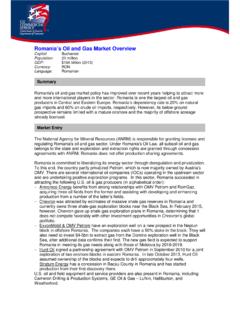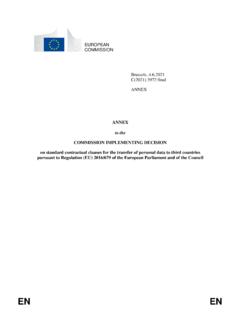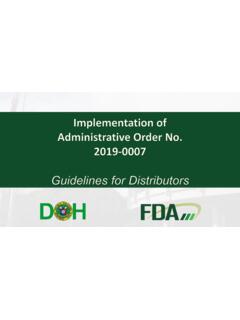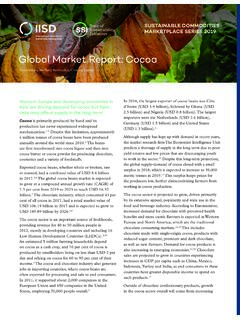Transcription of Canada: The Non-Resident Importer Program
1 Tracey Ford July 2015 Summary companies seeking to expand their sales into foreign markets should consider Canada first when deciding where to begin exporting. The Canadian marketplace is a highly receptive, open and transparent market for products. Canada is also the largest and most important export market to the United States. In fact, Canada is the number one export market for 35 of 50 States and our markets share many similarities: a common business language, similar business practices, a strong legal frameworks and similar cultures. An important key to achieving market penetration and expanding export sales to Canada is to minimize the Canadian customer s work by making the transaction resemble a Canadian domestic transaction.
2 This can be accomplished through the Non-Resident Importer Program (NRI). The NRI Program is an initiative of the Canada Border Services Agency (CBSA) that takes the burden of importing off the Canadian purchaser and allows the exporter to sell to Canada on a delivered-price basis rendering the ordering process more transparent and stable to the Canadian customer. The Non-Resident Importer A Non-Resident Importer (NRI) is an organization located outside of Canada that ships goods to customers in Canada and assumes responsibility for customs clearance and other import-related requirements. This Program allows the exporter to include all shipping, customs clearances, duties and taxes in the shipping and handling fees charged to the customer, and may even be charged in Canadian dollars.
3 In this way, the transaction appears to the Canadian consumer as a domestic transaction. Benefits of Becoming A Non-Resident Importer There are many benefits in registering for the NRI Program to a company that is exporting to Canada. Simplifies pricing By including transportation costs, customs clearance fees, duties and taxes in the selling price of the goods, the company can create price certainty for their Canadian customers. This eliminates surprise additional fees once the goods pass into Canada. Eases the trade process for the Canadian customer With the company acting as both the exporter of record and the Importer of record, the Canadian consumer does not have to be involved in the import process which makes doing business as easy as purchasing from a Canadian company.
4 Increases the company s competitive advantage By consolidating shipments, the vendor can clear the goods in their own name as one clearance to reduce the cost of shipping, creating significant savings that can be passed on to the Canadian customers. Improves shipment control Acting as the exporter and Non-Resident Importer , the vendor controls the shipping process door-to-door. This minimizes customs delays and allows the vendor the ability to track the movement of the shipment. Expands the company s market reach into Canada Through the improvements in customer service generated by the NRI Program , companies that participate are able to increase their market share in Canada and compete more effectively with Canadian companies and competitors.
5 Canada: The Non-Resident Importer Program 2 Canada: The Non-Resident Importer Program How to Become a Non-Resident Importer companies that make export sales to Canada can become a Non-Resident Importer . The Program is best suited for companies selling direct to Canadian consumers, retailers and businesses. The best way to register for the NRI Program is through a customs broker. A customs broker offers many services that will aid a company as they begin exporting to Canada. A broker will: ensure that the company is compliant as an exporter to Canada, ensure that the company is taking advantage of NAFTA benefits wherever possible, help to develop the product s final price (including duty, taxes, transportation and brokerage fees), explain Canadian taxes, assist with simplifying documentation, establish the Non-Resident Importer account including obtaining a Canadian Business Number and completing the Agreement for Maintaining Books and Records Outside of Canada.
6 There is no specific charge for establishing a company as an NRI; however, customs brokers may charge a fee for assisting with set up. For more information on customs brokers, contact your local Commercial Service office at NRI Program Considerations An NRI is subject to Canada s Customs Act and related regulations, which are administered by the Canada Border Services Agency. vendors registered under the NRI Program should be aware of additional considerations when exporting under the Program . Canadian Taxes Almost all goods imported into Canada are subject to the Goods and Services Tax (GST). The 5 percent GST is payable upon importation and is based on the duty paid value of the goods. The following Canadian provinces have harmonized their provincial taxes into Harmonized Sales Tax (HST): Ontario, New Brunswick, Newfoundland and Labrador at a rate of 13% British Columbia at a rate of 12% Nova Scotia at a rate of 15% Quebec, which has Quebec Sales Tax (QTS) at a rate of All companies that are considered to be carrying on business in Canada and have annual sales exceeding CDN$30,000 are required to register for the GST and may have to post a GST bond.
7 After registering for a GST account, the company must prepare and submit a GST return at selected intervals showing the amount of tax that was collected and remitted to the Canada Revenue Agency. There is no additional requirement for taxes under the NRI Program . Determining Duty and Tariff Based on the universal Harmonized System (HS Code), the rate of duty is determined by accurate tariff classification and country of origin. Binding rulings are available from Canada Customs (CBSA) if the classification is in doubt; however, most commodities are specifically named and can be readily qualified. NAFTA Certificate of Origin If the product originates in the United States or Mexico, it may have a preferential tariff treatment under the North American Free Trade Agreement (NAFTA).
8 As an NRI, only one NAFTA Certificate of 3 Canada: The Non-Resident Importer Program Origin is required for a blanket period of one year and it will be held to cover all of the vendor s shipments to Canada. Customs Clearance Documentation All exports to Canada require specific information for clearance through Canada Customs. In addition to a copy of the commercial invoice, the Canada Customs Invoice (CCI) is the most common form utilized and is required for all shipments valued over CDN$2,500. For shipments valued at CDN$2,500 or less, a commercial invoice can be used instead of a CCI provided the required data elements are included. Canadian Business Number A Business Number (BN) is required from all companies conducting business in Canada.
9 In order to start importing into Canada, companies will have to apply for a BN, as both the Canada Border Service Agency and Canada Revue Agency will interact with the company through this number. The BN applies to the four main Revenue Canada business accounts; corporate income tax, payroll deductions, GST/HST, and import/export. Obtaining a BN should be the first step in becoming a NRI. The general documentation required to import goods into Canada is: Vendor and purchaser name and address Importer of record Full description Country of origin Quantity (packages and weight) Value (Unit price and extension) Currency of settlement ( or Canadian dollars) Condition of sale Some shipments entering Canada may require additional documents such as permits, certificates, licenses, and bills of lading.
10 Certain commodities entering Canada are controlled/restricted for various reasons. Furthermore, depending on the nature of the goods, certain other Government department requirements or certifications may apply. The following industries are subject to other government departments: food and food-related products; apparel goods, textile articles, steel products animals, plants and certain wood products energy consuming products; pre-packaged consumer products; motor vehicles and tires; drugs, medical devices and hazardous products. For more information on these requirements visit the CBSA website. For More Information The Commercial Service in Ottawa, Canada can be contacted via e-mail at: Phone: 613-688-5406; Fax: 613-238-5999; or visit our website: The Commercial Service Your Global Business Partner With its network of offices across the United States and in more than 80 countries, the Commercial Service of the Department of Commerce utilizes its global presence and international marketing expertise to help 4 Canada: The Non-Resident Importer Program companies sell their products and services worldwide.









